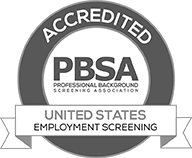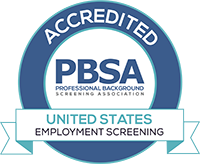BLOG
Taking Adverse Action Based on a Background Check
November 16, 2016
You conduct an interview and feel you've found an ideal candidate. Then, a background check shows the person is not qualified or eligible for the job. What should you do next?
Start with a Screening Plan
Before answering that question, we're going to backtrack a bit. Every business should develop a written plan that sets guidelines and expectations for the entire hiring process.
Most businesses hire for a variety of positions. Create screening policies for every position you might need to fill, and refer to them whenever you are hiring. These documents should discuss initial screening and interview practices, the type of background check you will run for every position, what you are looking for in the results, and what might warrant an adverse action.
Creating these policies helps you establish a reliable hiring process and shows hiring managers what steps to take when an individual is not eligible for employment.
Pre-Adverse Notification
An adverse action is defined as anything that is unfavorable to a consumer. In a hiring scenario, the adverse action is generally denying employment to an applicant. Before that happens, you must send the individual a pre-adverse notification.
The pre-adverse notice informs a candidate that an adverse action is being considered, but is not currently in progress. Along with this notice, the person must also receive a written Summary of Rights Under the Fair Credit Reporting Act, a copy of their background check, and time to contest the results of their report.
No specific amount of time is specified, but the recommended minimum is one week and best practice is around 30 days. During this time, the applicant has the right to file a dispute if they believe the background check was unfair or inaccurate.
Sending Adverse Notification
If the applicant does not dispute the results of their background check, then the employer may initiate an adverse action. There are specific steps that must be followed.
The applicant must be notified of the impending action. This involves informing the person that they did not get the job to which they applied. They must also receive a Summary of Their Rights Under the FCRA, and contact information for the Consumer Reporting Agency (CRA) that prepared their background check. This allows the applicant to initiate a dispute with the CRA if they feel it is warranted.
Maintain Consistency and Fairness
One of the most important things to do when hiring is to establish and follow fair, consistent screening policies. This helps you find the best people for any job, and determine when it is time to initiate pre-adverse actions.
Just because an applicant has something that might be construed as negative on their record does not necessarily mean they aren't eligible for employment. At Backgrounds Online, we provide comprehensive reports that contain the facts you need to make the best possible hiring choices. Turn to us for background checks that can be used to determine an applicant's eligibility, and for the documentation you need when you must make the decision to not offer employment.
Follow FCRA Regulations
It is essential for businesses to follow FCRA regulations throughout the hiring process. We've seen numerous stories about large companies that have been hit with lawsuits or other legal entanglements because they failed to adhere to the requirements set forth by state and federal laws.
At Backgrounds Online, we endeavor to keep up with new and evolving laws that impact our customers. If you have questions about screening your applicants, or if you need to initiate a pre-adverse notification, then contact us for assistance.
Please note that we do not provide legal advice in any way. We do, however, offer sample pre-adverse and adverse letters, as well as the consumer's Summary of Rights Under the FCRA.







